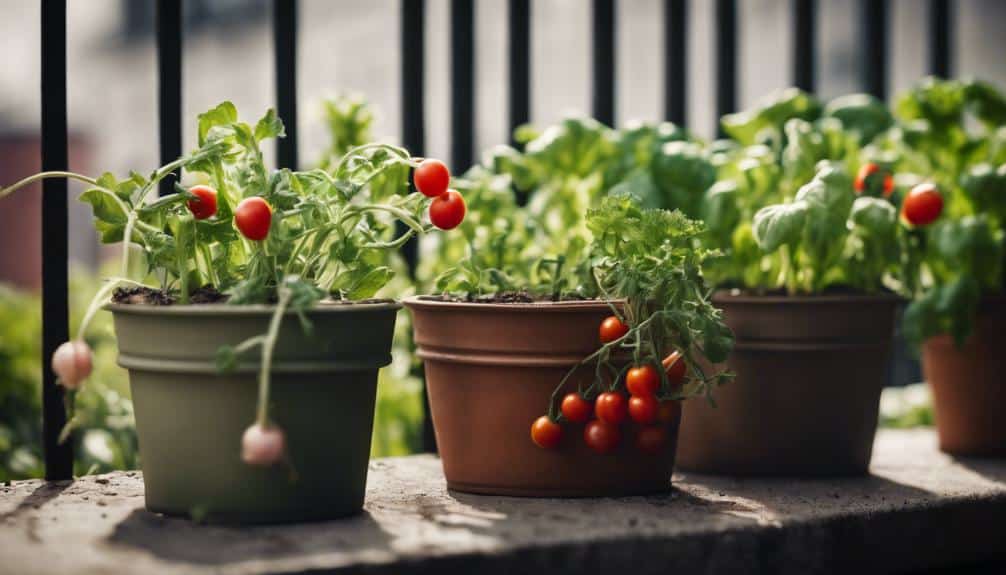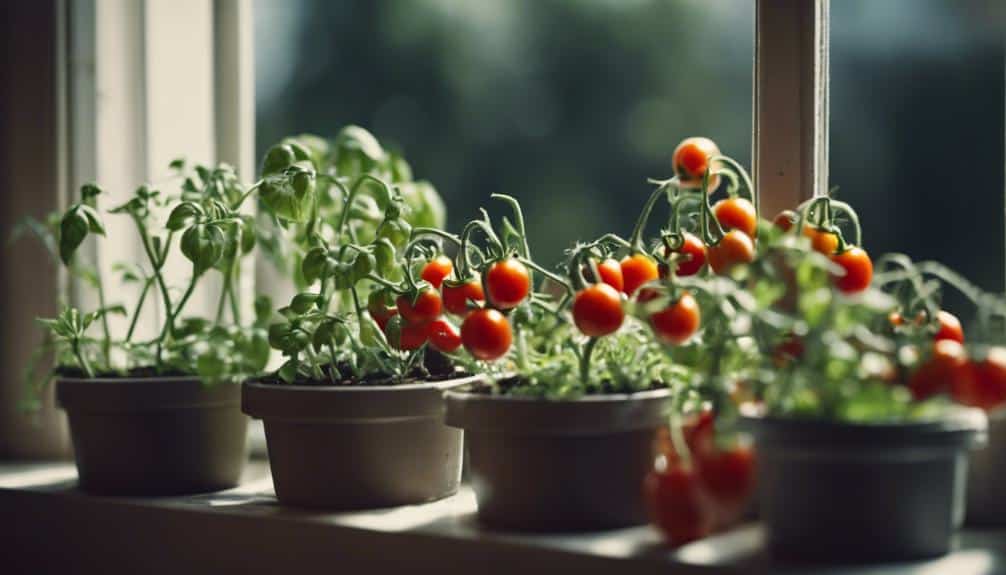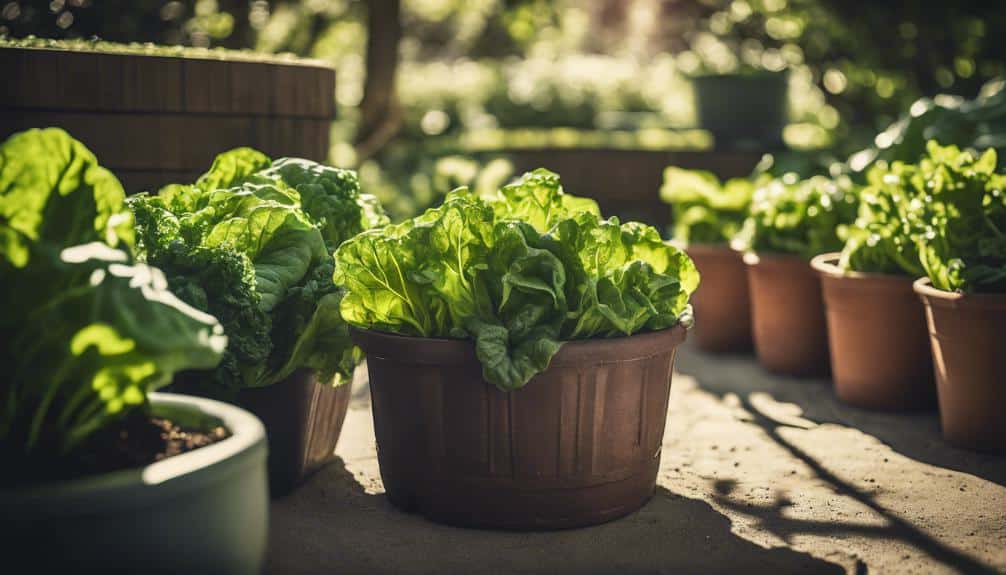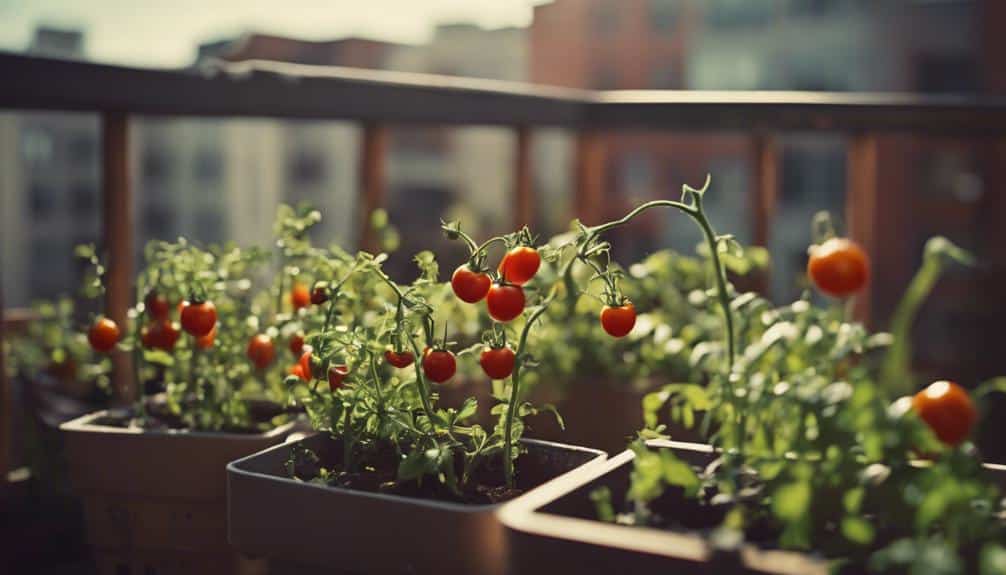When looking to maximize space, consider cherry tomatoes, lettuce, spinach, basil, chives, radishes, and compact peppers. These veggies thrive in small containers or tight spots.
Strawberries, blueberries, and raspberries, along with dwarf citrus and fig trees, are great for container gardening.
Low-maintenance succulents like aloe vera and herbs like mint also do well in confined spaces.
High-yield crops such as cherry tomatoes, beans, spinach, radishes, and zucchinis flourish abundantly.
Partial shade? Opt for spinach, lettuce, kale, herbs, radishes, beets, astilbe, and impatiens. Certain plants triumph even with less sunlight. Discover more space-saving gardening tips within.
What vegetables require minimal space?

If you’re short on space but still want to grow vegetables, there are several options that require minimal space.
One great choice is to grow cherry tomatoes. These compact plants can thrive in small containers and provide you with a bountiful harvest of sweet, juicy tomatoes.
Another excellent option is to plant leafy greens like lettuce or spinach. These vegetables don’t need much room to grow and can be easily cultivated in small pots or even vertical gardens.
Herbs such as basil, parsley, or chives are also perfect for tight spaces. They can be grown on windowsills, balconies, or small outdoor areas, adding fresh flavors to your meals.
Radishes are a fantastic choice for small gardens. They grow quickly and are ideal for containers or raised beds. Peppers, both sweet and hot varieties, can also be grown in compact spaces as long as they receive enough sunlight.
| Vegetable | Water Needs | Sunlight Needs | Other Needs |
|---|---|---|---|
| Tomatoes | Consistent moisture, 1-2 inches per week | Full sun (6-8 hours) | Well-draining soil, support for vines or cages, regular fertilization |
| Leafy Greens (Lettuce, Spinach, Kale) | Consistent moisture, 1 inch per week | Partial to full sun (4-6 hours) | Well-draining soil, regular harvesting to encourage new growth |
| Radishes | Consistent moisture, 1 inch per week | Full sun (6 hours) | Well-draining soil, cooler temperatures |
| Carrots | Consistent moisture, 1 inch per week | Full sun (6 hours) | Well-draining, loose soil (at least 12 inches deep) |
| Herbs (Basil, Cilantro, Parsley) | Consistent moisture, 1 inch per week | Full sun (6 hours) | Well-draining soil, regular harvesting |
| Green Beans | Consistent moisture, 1 inch per week | Full sun (6-8 hours) | Well-draining soil, support for vines or cages |
| Peppers (Bell, Jalapeño, etc.) | Consistent moisture, 1-2 inches per week | Full sun (6-8 hours) | Well-draining soil, regular fertilization |
| Dwarf Tomatoes | Consistent moisture, 1-2 inches per week | Full sun (6-8 hours) | Well-draining soil, support for vines or cages, regular fertilization |
| Cucumbers (Bush or Dwarf Varieties) | Consistent moisture, 1-2 inches per week | Full sun (6-8 hours) | Well-draining soil, support for vines or cages |
| Eggplants (Dwarf Varieties) | Consistent moisture, 1-2 inches per week | Full sun (6-8 hours) | Well-draining soil, support for vines or cages, regular fertilization |
| Beets | Consistent moisture, 1 inch per week | Full sun (6 hours) | Well-draining soil, thin seedlings to 3-4 inches apart |
| Chard (Swiss Chard) | Consistent moisture, 1 inch per week | Partial to full sun (4-6 hours) | Well-draining soil, regular harvesting to encourage new growth |
| Peas (Dwarf Varieties) | Consistent moisture, 1 inch per week | Full sun (6-8 hours) | Well-draining soil, support for vines or cages |
| Zucchini (Bush Varieties) | Consistent moisture, 1-2 inches per week | Full sun (6-8 hours) | Well-draining soil, regular fertilization, harvest frequently |
| Microgreens (Radish, Beet, Sunflower) | Consistent moisture, daily watering | Partial sun (4-6 hours) | Well-draining soil, harvest when 2-4 inches tall |
Which fruits are well-suited for containers?
Considering your limited space for gardening, you may want to explore which fruits are well-suited for containers.
While fruits like strawberries, blueberries, and raspberries are popular choices for container gardening due to their compact size and adaptability, other fruits can also thrive in containers.
Citrus trees such as dwarf lemon, lime, or orange trees are excellent options for containers as they not only provide fresh fruits but also add an invigorating aroma to your space. Fig trees, especially dwarf varieties, can also do well in containers, offering delicious fruits and attractive foliage.
You may consider growing dwarf apple or pear trees in containers, ensuring they receive adequate sunlight and proper care. These trees can yield tasty fruits while adding a touch of elegance to your container garden.
Choose containers with sufficient drainage, use high-quality soil, and provide appropriate sunlight and water to help your fruits flourish in a limited space.
What plants are low-maintenance urban gardeners?

Low-maintenance plants for urban gardeners include succulents and herbs that require minimal care and can thrive in small spaces.
Succulents, such as aloe vera and jade plants, are hardy and drought-resistant, making them perfect for those with busy schedules. These plants store water in their leaves, reducing the frequency of watering needed.
Herbs like mint, basil, and chives are also great choices for low-maintenance urban gardening. They can be grown in small pots on balconies or windowsills, providing fresh flavors for your meals with little effort.
When caring for succulents, make sure they receive enough sunlight and avoid overwatering, as they’re prone to root rot.
Herbs generally prefer well-draining soil and regular pruning to encourage growth. By choosing these low-maintenance plants, you can enjoy the benefits of gardening without the need for extensive time and effort.
Are there any high-yield urban crops?
Urban gardeners seeking high-yield crops can benefit from focusing on compact varieties of vegetables that produce abundantly in small spaces.
When space is limited, choosing crops that offer a bountiful harvest is essential. Below is a table showcasing five high-yield urban crops that thrive in small spaces:
| Crop | Space Needed | Yield per Plant | Ideal Container Size |
|---|---|---|---|
| Cherry Tomatoes | Small | High | 5-gallon pot |
| Dwarf Beans | Small | High | 12-inch container |
| Baby Spinach | Small | High | Window box |
| Radishes | Small | High | 6-inch pot |
| Zucchini | Moderate | High | 18-inch container |
These high-yield crops are perfect for urban gardening, providing a plentiful harvest without taking up too much space.
What grows well in partial shade?

For those gardening in partially shaded areas, certain plants thrive in these conditions and can still yield a successful harvest.
Leafy greens such as spinach, lettuce, and kale are excellent choices for partial shade. These vegetables don’t require full sunlight and can actually benefit from some protection against the hot afternoon sun.
Additionally, herbs like mint, parsley, and cilantro can flourish in partially shaded spots, adding flavor to your dishes without needing direct sunlight all day.
Another option for partial shade is root vegetables like radishes and beets. These plants can tolerate less sunlight compared to other vegetables, making them suitable for areas with dappled light or morning sun exposure.
If you’re looking to add some color to your garden, consider planting astilbe or impatiens, which are beautiful flowering plants that do well in partial shade.
Frequently Asked Questions
Can These Vegetables Be Grown Indoors?
You can definitely grow these space-saving vegetables indoors. With proper lighting, containers, and care, you can enjoy fresh produce even in limited space. Indoor gardening can be a rewarding and fruitful experience for you.
How Often Should These Vegetables Be Watered?
Water your vegetables regularly to keep the soil moist but not soggy. Check the moisture levels by sticking your finger into the soil. Adjust watering frequency based on plant type, size, and environmental conditions.
What Pests Are Common for These Vegetables?
To protect your veggies from common pests, try using natural remedies like neem oil or diatomaceous earth. Regularly inspect your plants for signs of infestation and promptly address any issues to keep your garden healthy.
Are These Vegetables Suitable for Vertical Gardening?
Yes, these vegetables are suitable for vertical gardening. You can grow them in small spaces by utilizing trellises or vertical planters. It’s an efficient way to maximize your garden area and produce a bountiful harvest.
Can These Vegetables Be Grown Hydroponically?
Yes, you can grow these vegetables hydroponically. It’s an efficient method that saves space and resources. With the right setup and care, you’ll enjoy fresh produce year-round, regardless of outdoor conditions.
